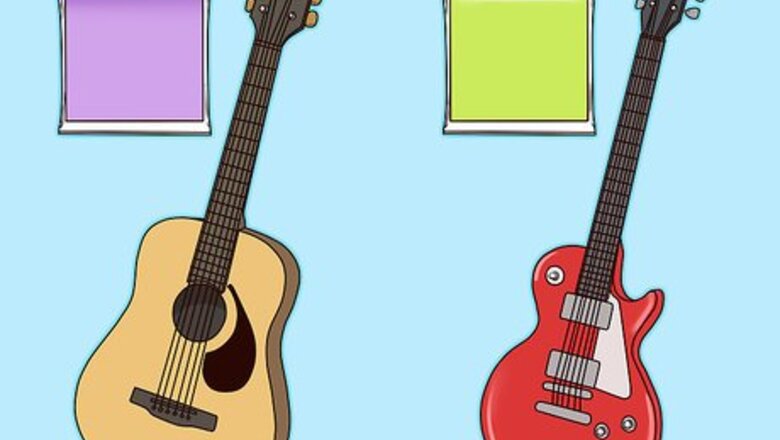
views
Getting the Right Kind of Strings

Determine whether you have a classical, acoustic, or electric guitar. Classical guitars use nylon strings while acoustics and electric guitars typically use metal strings. The gauge sizes for strings differ depending on what kind of guitar you have and getting the wrong type of strings can damage the guitar's bridge and neck. Figure out what kind of guitar you own and then look for strings made specifically for it. Metal strings will be hard and feel cold, while nylon strings will be soft and feel like plastic. Nylon strings are often easier on the hands than metal strings.
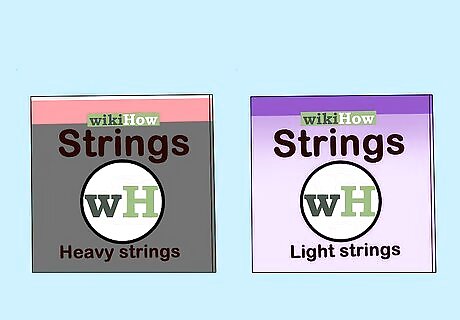
Choose strings that match your budget and skill level. If you're a beginner and just starting off, don't waste your money on expensive strings. You'll need to learn the basics of how to play the guitar before string choice makes much of a difference. Heavier strings will be harsher on your fingertips and are often harder to push down, while lighter strings will be easier to play but will break more often.

Play with different string types. The only way to know what kind of strings you prefer is by using them. Play your guitar with different kinds of strings and take note of how it changes the feeling and sound of your guitar. Choose strings that best enhance your style of play. EXPERT TIP Nicolas Adams Nicolas Adams Professional Guitarist Nicolas Adams is a 5th generation musician of Serbian Gypsy descent and the lead guitarist of the band Gypsy Tribe. Based in the San Francisco Bay Area, Nicolas specializes in Rumba Flamenco and Gypsy jazz and playing the guitar, Bouzouki, Balalaika, and piano. Nicolas Adams Nicolas Adams Professional Guitarist Consider the tension of the strings, as well. The style of guitar will affect the tension you need. For instance, classical guitars will have medium-to-low tension, while flamenco guitars are made for a high-tension feel. Lower tensions are softer on your hand and easier to play, but they also bend easily and you have to be careful of intonations. Higher tensions will give you a firmer feel on the guitar, and they'll respond more because of the extra pressure.
Choosing Strings for Acoustic Guitars
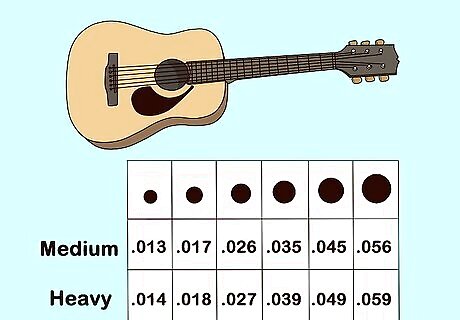
Get heavier strings for larger bodied acoustic guitars. Heavier strings will typically sound better on larger body guitars, while lighter strings sound better on smaller instruments. If your guitar's body is big, medium to heavy gauge strings will sound better in its larger sound chamber. Medium acoustic string gauge sizes include .013 .017 .026 .035 .045 and .056. Heavy acoustic string gauges include .014 .018 .027 .039 .049 and .059.
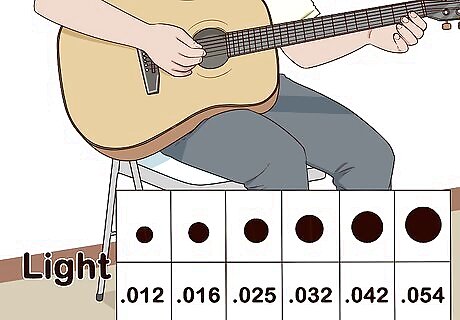
Get lighter gauge strings for a finger picking. Lighter gauge strings will be much easier on your fingers and sound better when you're finger picking. If you are doing heavy strumming or play rhythm, consider getting heavy gauge strings instead, so that they don't break as easily. Lighter gauge strings include sizes .012 .016 .025 .032 .042 and .054.

Get heavier strings for more bass. If you want the sound of your guitar to have more bass, choose heavier gauge strings. Alternatively, lighter strings will accentuate the treble in the guitar and are best for subtle strumming and picking techniques.
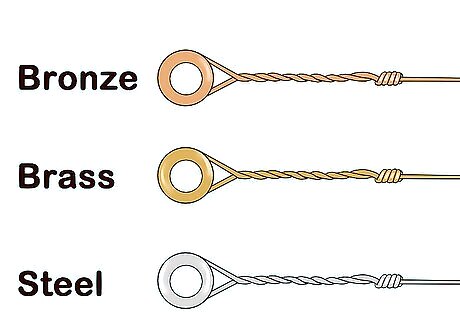
Choose a material to change the tone. Acoustic guitar strings typically come in bronze, brass, and steel. Bronze strings have a clear, bright tone, but tend to rust more easily than other materials. Brass strings will have a more metallic sound while steel strings can create a more delicate tone and is commonly used among folk guitarists. Choose a material that lends itself to your style of play.
Picking Strings for Electric Guitars

Choose lighter gauge strings for soloing. Lighter strings will be easier to bend and provide less resistance, which makes it easier to solo on an electric guitar. Select lighter gauge strings if you solo frequently. Light electric guitar strings include gauges .010 .013 .017 .026 .036 and .046.

Select heavier strings if you play rhythm. If you're a rhythm guitarist, you should get medium-heavy gauge strings. Heavy gauge strings are also good for bass-heavy music like heavy metal or hardcore and sound great in drop-D tuning. Medium strings include sizes .011 .015 .018 .026 .036 and .050. Heavy gauge strings include sizes .012 .016 .020 .032 .042 and .054.
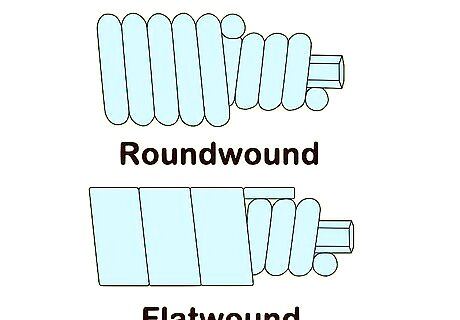
Decide on whether you want roundwound or flatwound strings. Roundwound strings have a ridged texture and can create a longer sustain. They also make more sound as you slide your hand up and down the neck of the guitar. On the contrary, flatwound strings are flat to the touch and lend themselves well to jazz and blues music. Halfwound strings are the happy medium and possess the texture of round wound strings with less attack.
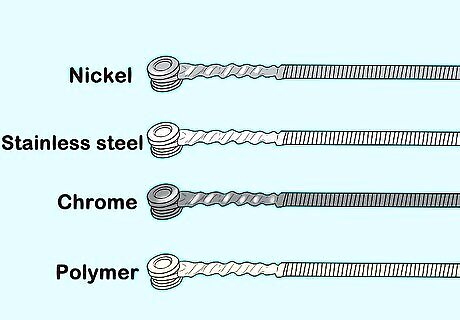
Select the material you want your strings made of. There are several different materials that electric strings can be made of and include nickel, stainless steel, chrome, and polymer. Each material gives the electric guitar slight tonal changes. Stainless steel will give the guitar a crisp, bright tone while nickel strings will give the guitar a warmer sound. Chrome strings will make the guitar sound warmer and is often chosen by jazz and blues guitarists.
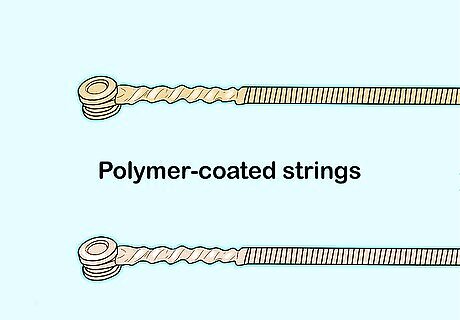
Get coated strings for durability. Polymer-coated strings have less sustain than other strings but are more durable and corrosion resistant. They will also prevent dirt and oil buildup from destroying your strings over time. If you have a bigger budget for strings and don't want to replace them frequently, consider buying coated strings.
Getting Strings for Classical Guitars
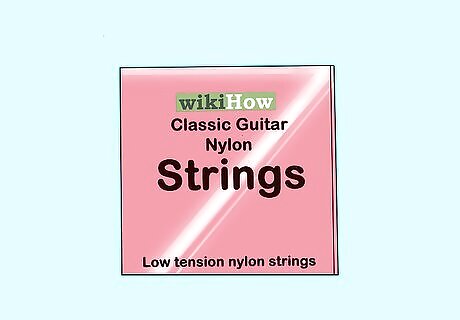
Purchase low tension nylon strings for easier fretting. If you're having trouble achieving a clear sound on your classical guitar, you may want to put low tension strings on it. They are easier to push down and are best for beginners.
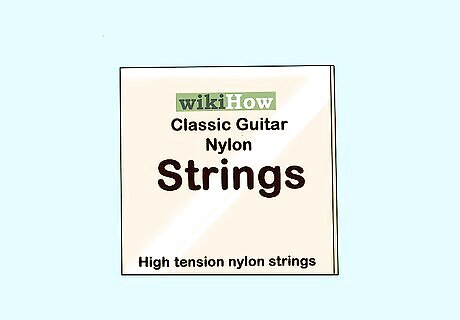
Get high tension strings for a louder sound. If you don't have issues with fretting, you may want to get high tension strings for to give your guitar more projection. These strings are harder to hold down but are better for rhythm players.

Select the right material for your nylon strings. Nylon strings are made of clear nylon, rectified nylon, and carbon fiber. Clear nylon strings have a clean and crisp sound, while rectified nylon strings have a more mellow sound and tone to them. Carbon fiber strings give a brighter edge to the guitar than both nylon variations do.




















Comments
0 comment